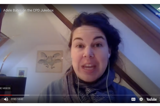A child just swore at me in front of the class - what should I do now?
We asked associate and behaviour expert adele bates and this is what she suggested for our cpd jukebox.

Scroll down for the full transcript of Adele's response
“A kid's just sworn at you! So, it all depends on the context of the swearing and the context of your school and the context of this young person.
‘Oh F*ck!’
Let me give you an example. Let's say that Tyler is a school refuser. Let's say you haven't seen him for three weeks as he hasn't been in school.
He's got anxiety issues, maybe there's stuff going on at home and one morning he makes it into school and, as he walks in, he bashes his shoulder and he goes “oh f*ck!”.
In that moment I'm sure you can answer this question yourself - would it be helpful to Tyler's education, his academic progress and his learning to punish him for that swearing?
Radio-Friendly Language
Of course, the answer is no, because the wider context of that young person in that moment is ‘Oh my goodness, he stepped foot in school!’ and now we can start working with him.
Yes, I'm not saying that we don't perhaps have a little reminder, I mean my favourite is always “Oh gosh no, I only do radio-friendly language!”. You can find your own way to not ignore it at all but, you've really got to pick your battles and I think that that's one example.
Boundaries
On the other side you might have a class that you've worked with for a long time, they know you they know your expectations and they swear at you in order to rile you or in order to get some fun or laughter from some
They're trying to push your boundaries. And in that case you need to reinstate your boundaries around swearing and that will be to do with your school's policy, it will be to do with your classroom expectations.
So, for example I teach English and drama, and those are subjects where swearing can come up within the context of the conversation or the literature that we're studying or, maybe there's some improvisation going on with the kids and that comes out - you can work around that as well.
SEMH
I found it was really good when I worked in a an SEMH school and we were doing some drama and they were
they were acting out conflict and I said “okay, no swearing” and because I put that rule in place it actually forced them to get really creative with that vocabulary which was really cool.
Know your Pupils!
The final point on this context and swearing piece is know your pupils!
So, for some pupils the odd bit of loose swearing might be a normal thing, but if you've got a pupil who doesn't usually swear and starts that - whether they start that just to themselves, or maybe they start using those swear words about themselves in a really self-negative way or maybe they suddenly start using it to try and get that attention.
Think about what's behind that? What does that mean? Why do they need more attention? Why are they putting themselves down? Why are they trying to aggravate you?
And, that becomes where you start to do your investigation by asking yourself, what's happening with this child and why has there been this shift?
Context Counts
The other slightly challenging thing that teachers and educators often find is that maybe home life has different expectations around language to school. And we have to explicitly explain that and explicitly discuss that and we can use examples.
So, for example as I said I’m an English teacher - if you bounce a ball in my class I'm going to stop that because that's not that's not suitable for my classroom in general. But if you're in PE obviously that's a great thing.
Good Little Trick
So, we can talk about context really explicitly and age appropriately with the young person like, “OK, I understand that when you're hanging around with your mates that you swear, fine. But let's think about what might be more appropriate for in school and what might be appropriate for when we're in the workplace and maybe when we are talking to small children”.
That's always a really good little trick if you've got a young person who swears all the time, just in that kind of lexicon, then put them with some younger children and you will see instinctively suddenly the swearing will go down proving that they can speak without it.
I hope there's some useful tools there and I look forward to connecting with you in the future!
Thank you!”
You can check out all the other 'tracks' on our CPD Jukebox by clicking here.
To find out more about how we can help your school or college with behaviour and relationships, call us on 01267 211432 or drop us an email on learn@independentthinking.co.uk.
Enjoy a free no-obligation chat.
Make a booking. Haggle a bit.
Call us on +44 (0)1267 211432 or drop us a line at learn@independentthinking.co.uk.

About the author
Adele Bates
Adele is a classroom behaviour specialist with a great understanding of issues around EBD, SEMH and SEND and the author of the book Miss, I Don't give a Sh*t.